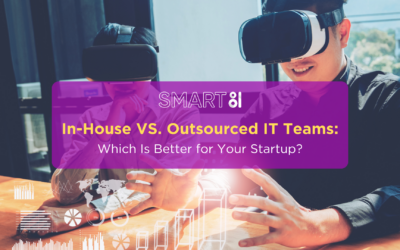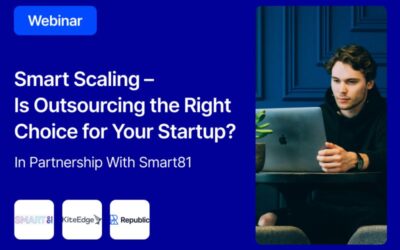Most people dreaming of starting their own technology business inevitably end up looking for inspiration from those that have achieved the most. How did Bill Gates actually start Microsoft? Well, he just started coding and built it himself. Being a coding genius from the age of 13, it can’t have been that hard. What about Zuckerberg? He was 12 when he learnt to code. Jobs? Ah! Jobs wasn’t a coder; he was a marketing genius. That said, Jobs had Woz, his first CTO and Co-Founder.
Logically therefore, if you are technically minded and can write code, then your journey can begin in a straightforward manner. Laptop in hand, you can burn the midnight oil, work weekends and whilst still earning money from your day job, start building your very own tech unicorn.
What if you can’t code?
What if you can’t code? How do you get started? Well, you will need money to build your product, which is fine if you have deep pockets or generous friends or family. Or, you can turn to the investment community. After all, you might have a great idea and good experience of the market you want to operate in. You may even have a network of potential customers. They may have even signed letters of intent to the tune of ‘if you build it, we’ll buy it’. You would think therefore, getting the funding you need to start building your product will be straightforward.
It’s true, all of this can make for a compelling argument when trying to raise money from investors. Often though, it isn’t enough. Common feedback goes along the lines of:
- “You need a technical Co-Founder”
- “We don’t invest in companies with a sole Founder”
- “Come back when you have launched your product”
- “Show us your traction, who is using your product?”
- “We only invest in companies with $50k+ MRR”
Never has the chicken and the egg analogy been more accurately applied than to companies that are looking to raise money in order to build a product to prove their hypothesis, which is required before they can raise money.
Is there another alternative? Surely not every successful founder comes from a coding background or has an amazing track record of building businesses, or is infinitely wealthy?
The answer is that yes, there are alternatives, but also (sadly), a lot of great business ideas created by great business people never get started because they cannot prove their market traction. We cannot blame the investors, many of whom get over 5000 pitch decks a year. Of course, they will select the companies that are further progressed. So how can you become one of those?
Focus on your MVP
Firstly, think about what an MVP actually needs to be. The first word is key: minimum. It doesn’t need to be an all-singing, all dancing super app, available across all platforms, 195 countries and in 100 languages. It needs to carry out its minimum functions, to a capable degree, to prove your hypothesis, show traction and crucially, get you to that next stage, be it a seed round or a big jump to series A. That money, will help you create your vision, build your proprietary algorithm, or whatever else it is that will take you to unicorn status.
With this in mind, look for off the shelf technical solutions, template-based platforms or other methods that will reduce the time it takes to build your product and the required expertise. All of this brings down your costs, to the extent that you might be looking at a $25k injection of cash, rather than $250k.
Find a trusted tech partner
In addition, find a company that can build it for a fixed cost, with experience of building products like yours. Experience, innovative thinking and a fair price can combine to give you the traction you need without having to carry out a major raise. It can also be preferable to finding a CTO who says they can build the product single handed in their spare time, but may ultimately not deliver, due to restriction or skills or time. For example, they may be a coding wizard but if they can’t style the front end, you are still going to need to bring in that resource and hook everything up, which again will cost money. By which time the CTO may have taken 50% of your company.
It is also worth thinking about the commercial terms you sign with your development partner. There are a few companies that will build an MVP for equity (Smart81 being one of those). Whether you want your developer as an equity partner is a personal choice and often, they will need to do more for you than just build product. Aside from trust, do they have the commercial experience and network of contacts to make your business a success? Will they participate in or lead later fundraising rounds? And how much equity will they want in exchange for all this?
Build on your terms
Lastly, think about those payment terms. Always pay in stages and negotiate favourable terms for you. Can you pay 3 months after launch? If you have investors lined up, you may not even need to dip into your pocket to pay the bill.
What’s in it for the dev firm then? Well, you can have debt convert to equity if you miss your payment dates and can’t renegotiate, so their risk is reduced. Ultimately though, a development partner with the right mindset, that understands your market and the problem you are trying to solve will support you and wants to see your business succeed. This show of faith will open the firm up to long term and large development projects as your business grows, as well as bragging rights that they saw the potential in your hot new start up from the very beginning. Entrepreneurialism comes in all shapes and sizes, but the mindset is usually the same – measured risk for high reward. The right development company will have the same approach.
This methodology won’t work for all Founders, of course. That said, if you are non-technical, it is unlikely that you’ll be looking for someone to build a proprietary or patent-worthy piece of technology. That normally comes from the Gates’ of this world. What is clear however, is that if you can create a business, get your tech built and launch it, before securing major investment, you are doing something right. Then next time you go looking for money pre-launch, you’ll have that track record that investors so often look for.




